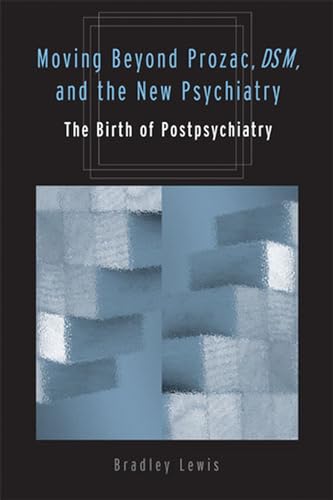Moving Beyond Prozac, DSM, and the New Psychiatry
The Birth of Postpsychiatry (Corporealities Discourses Of Disability)
Bradley Lewis
BOOK REVIEW

In a world gripped by an overwhelming obsession with psychiatric labels and prescribed medications, Bradley Lewis's Moving Beyond Prozac, DSM, and the New Psychiatry: The Birth of Postpsychiatry emerges as a provocative manifesto. This work is not just about challenging the status quo of mental health practices; it is a bold declaration, a rallying cry for a new paradigm in understanding human experience. Here, Lewis takes us on an exploration beyond the cold clinical confines, delving into the intricate tapestry of psychiatry that, for too long, has been ruled by reductionist perspectives and pharmaceutical solutions.
The critique of the Diagnostic and Statistical Manual of Mental Disorders (DSM) is not merely academic; it is deeply personal. Lewis dismantles the notion that mental illness can be adequately understood or treated through a mere checklist of symptoms. Each entry in the DSM tells a story, and yet, too often, those narratives are stripped away, reducing individuals to collections of diagnoses. In this gripping text, Lewis implores readers to acknowledge the complexity of human suffering that cannot be encapsulated by categories or pharmaceutical remedies. It is an urgent plea to embrace the richness of human experience-flaws, struggles, and all.
How many of us have felt the stifling embrace of psychiatric labels? Lewis's work resonates profoundly in a culture dominated by quick fixes and endless prescriptions. He brings to light the narratives of those who have been marginalized within the psychiatric system, illuminating the stories that often go untold. With each page, Lewis dismantles the mythos of infallibility surrounding psychiatric diagnoses, urging us to move toward a more compassionate and discerning understanding of mental health.
But what exactly is this "postpsychiatry" Lewis speaks of? It's a vision, a revolutionary perspective that acknowledges the limitations of our current systems while carving out a path forward. This is not a rejection of psychiatry but a call to expand its horizons, to embrace the messy complexities of lived experience, and to craft approaches that are as diverse as the human condition itself.
The reader is invited to witness a sea change-one that seeks not to merely stabilize through medication but to thrive through understanding, connection, and community. Lewis's insights push readers to confront discomfort, to seek out the vulnerabilities that lie just beneath the surface. By moving beyond the pharmaceutical quickfix, we can begin fostering authentic healing that honors the individuality of each person's journey.
What might truly shock you, however, are the passionate responses from readers. Some hail Lewis as a revolutionary, praising his courage to criticize conventional wisdom. Others, however, felt an unsettling dissonance, worried his ideas could risk undermining the very real needs of those who find solace in prescribed treatments. This tension speaks volumes about the discourse surrounding mental health today-where advocacy for understanding and compassion intermingles with the frustrations of those seeking effective relief.
Lewis emphasizes that our emotional struggles are not merely products of dysfunctional brains but are inextricably linked to our social contexts. Yes, the mind matters greatly, but so does the environment in which we navigate our lives. This connection beckons us to a deeper inquiry; if the systems we've relied on for guidance are faltering, then what alternative strategies must we explore?
Among the various criticisms leveled at Lewis's theory lies the concern about the risks of negating medical interventions that have genuinely changed lives. Yet isn't it precisely this kind of passionate discourse that propels our understanding of mental health forward? As we grapple with the implications of Lewis's arguments, we stand at the precipice of transformation; a monumental reckoning of what it means to be human in a world where the pressure to conform to labels looms large.
Moving Beyond Prozac, DSM, and the New Psychiatry is not merely a book; it is a beacon of hope for patients, practitioners, and anyone who has ever found themselves entangled in the web of psychiatric care. It beckons you to confront your beliefs and immerse yourself in a dialogue that holds the potential to shift paradigms. This is not a story of despair, but one bursting with the promise of change. So, what are you waiting for? Dive into this transformative journey and discover the intricate, often overlooked layers of mental health that demand our attention and spark our compassion.
This riveting exploration will leave you questioning, reflecting, and ultimately yearning for a new dawn in psychiatric discourse-because the conversation is far from over, and your voice matters in shaping the path ahead. 🌟
📖 Moving Beyond Prozac, DSM, and the New Psychiatry: The Birth of Postpsychiatry (Corporealities: Discourses Of Disability)
✍ by Bradley Lewis
🧾 216 pages
2006
#moving #beyond #prozac #dsm #psychiatry #birth #postpsychiatry #corporealities #discourses #disability #bradley #lewis #BradleyLewis